The 1990’s


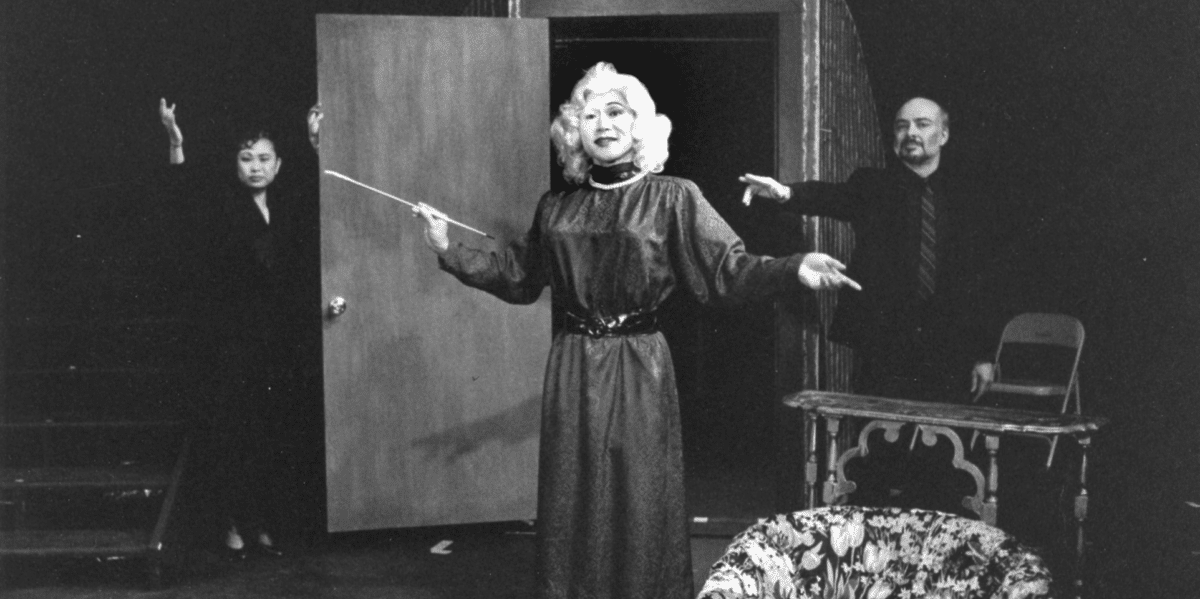

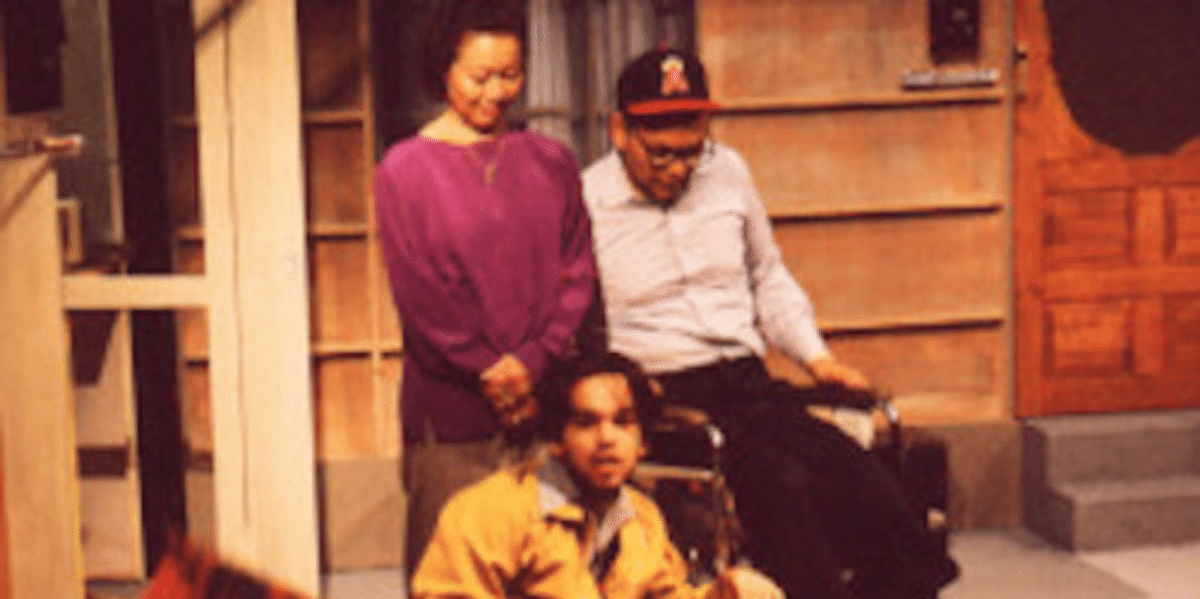

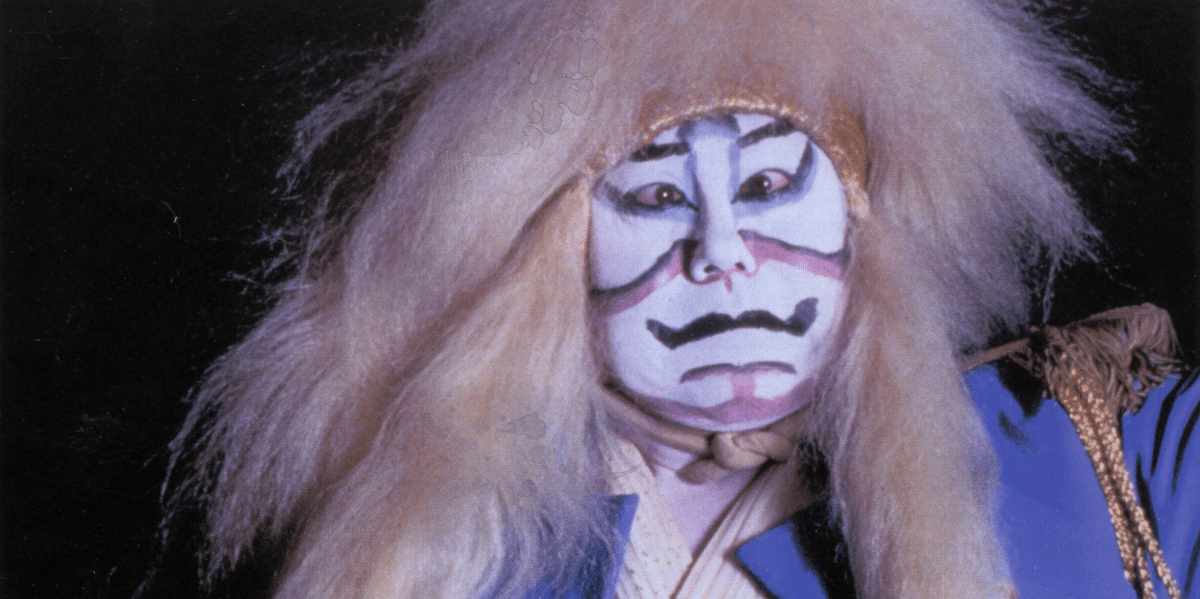

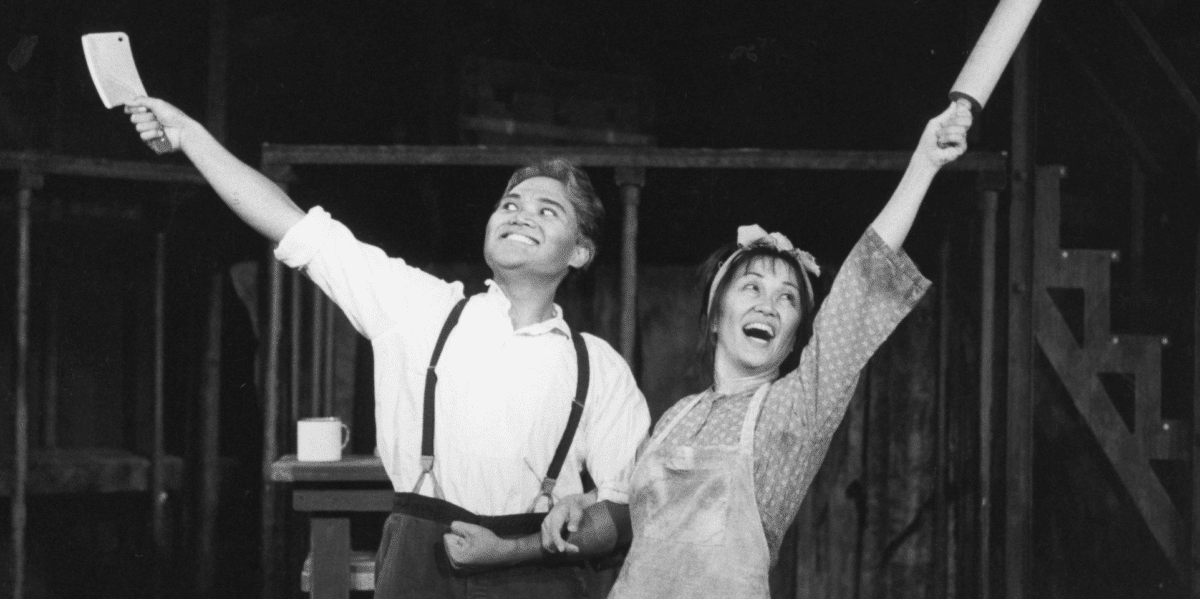

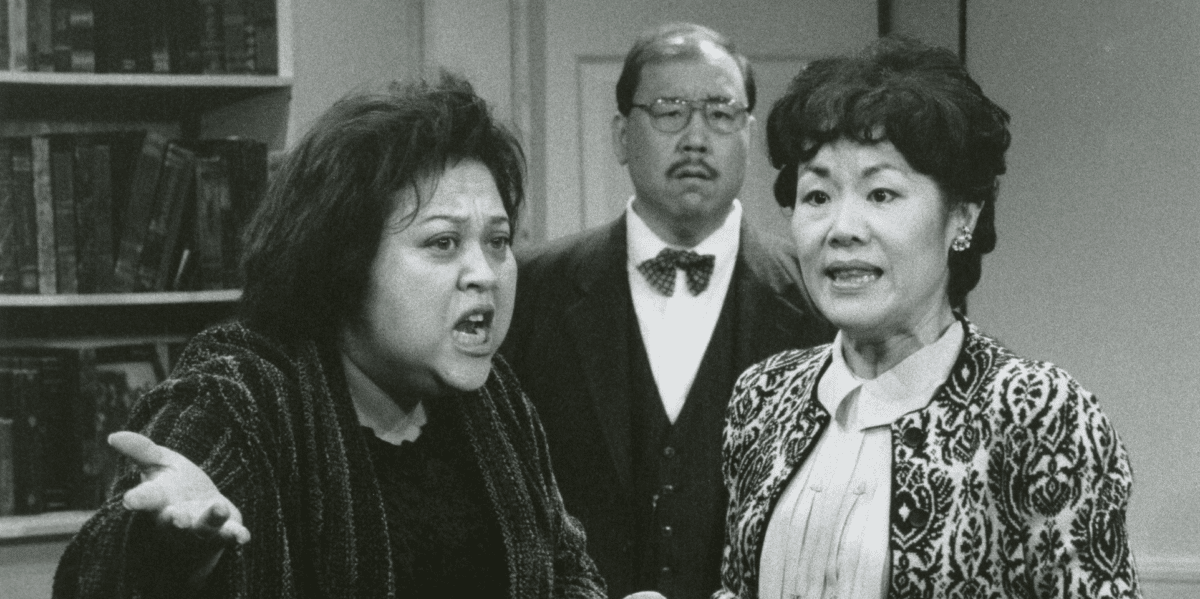

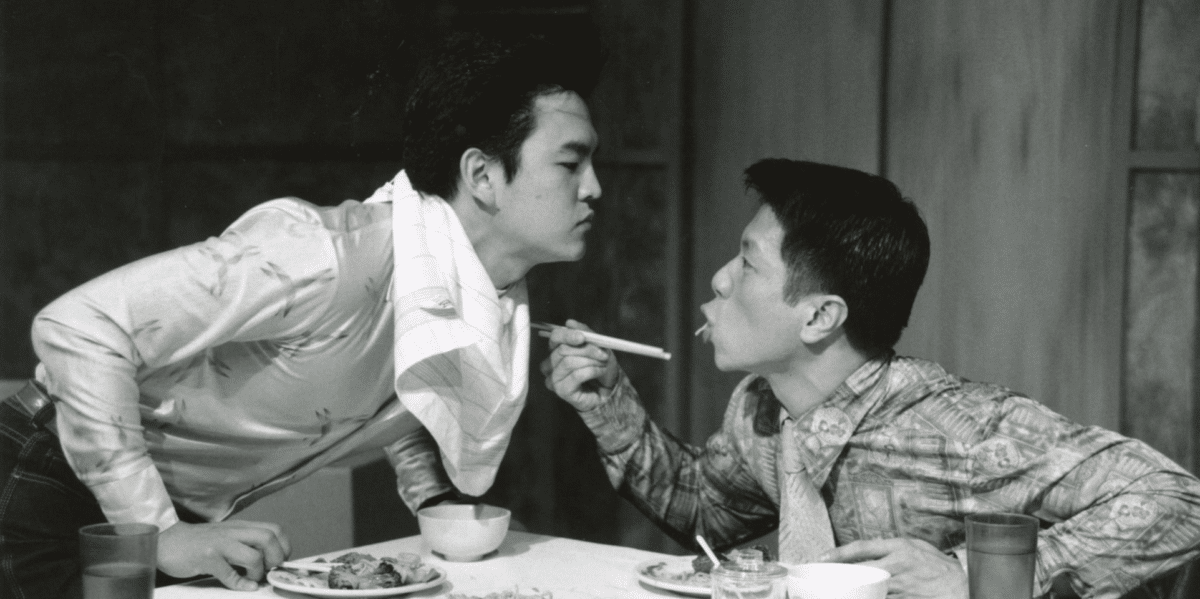


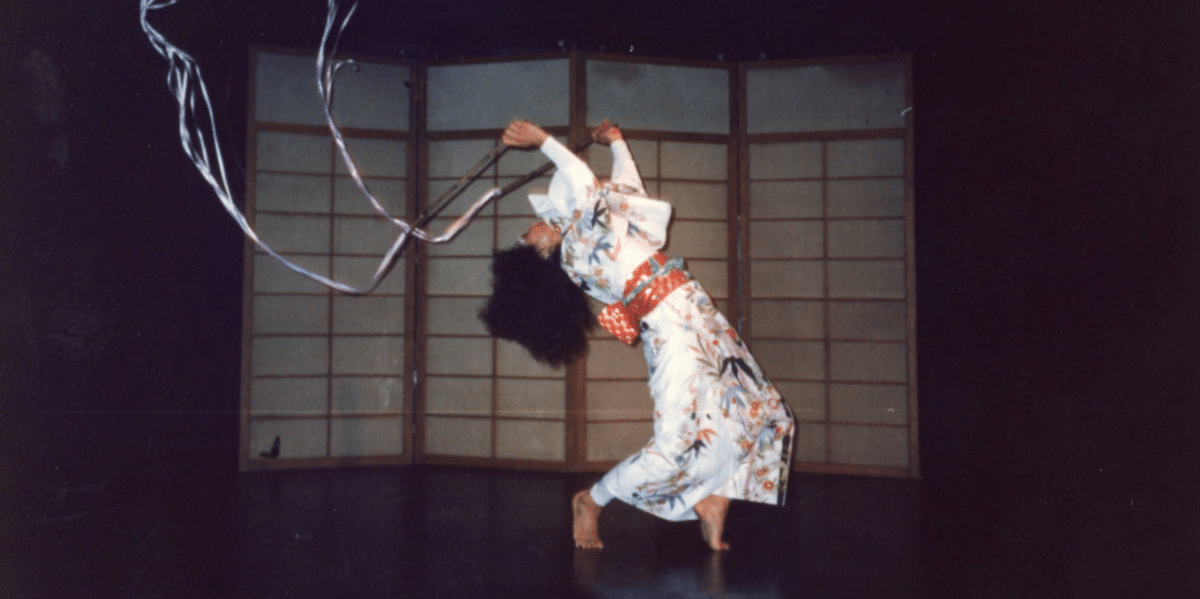

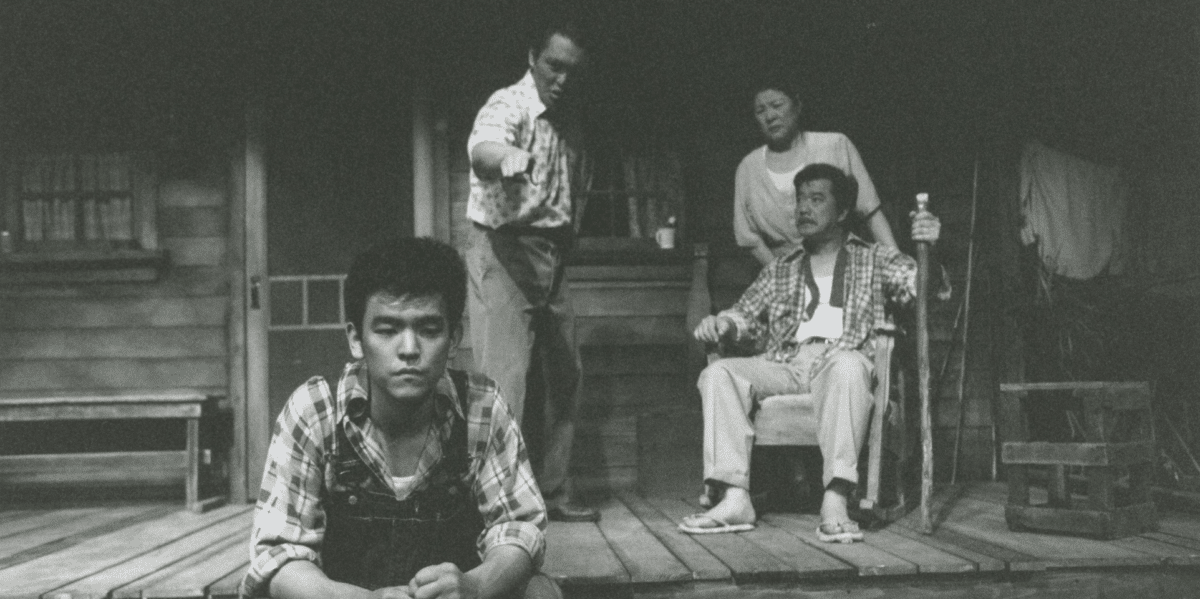
Return to History and Archive
1990-1991
Songs of Harmony
By Karen Hule
Directed by Heidi Helen Davis
Opened on October 17, 1990
-
This comedy follows the Songs, a family with three daughters in New York. Both parents are immigrants from Hong Kong. The Oldest daughter, Elaine, aspires to be a Broadway star; the middle daughter, Emily, plans to move in with her boyfriend; the youngest Suzanne struggles with ideas of Christianity and interracial marriage. This production is directed by Heidi Helen Davis, and opened on October 17, 1990.
Doughball
By Perry MIyake, Jr.
Directed by Patricia S. Yasutake
Opened on December 1, 1990
-
David, a Sansei, returns home for Christmas. When he meets an old classmate Andrea, the memory about the summer carnivals at the Venice Japanese Community Center revives. The summer of 1970 changed his world. This production is directed by Patricia S. Yasutake, and opened on December 1, 1990.
Hedda Gabler
By Henrik Ibsen
Directed by Dorothy Lyman
Opened on February 6, 1991
-
Hedda Gabler focuses on the frustrated existence of its title character, exploring core issues of power, control, and social expectation. Bored and restricted by her middle-class environment, Hedda plays out her own fantasies and psychological games with those nearest to her to an ultimately costly end.
This production was directed by Dorothy Lyman with Jude Narita starring in the titular role, and opened on February 6, 1991.
Canton Jazz Club
Book by Dom Magwili
Lyrics by Tim Dang
Directed by Tim Dang
Opened on April 17, 1991
-
Set in Los Angeles, 1943, Canton Jazz Club is one of the hippest of nightclubs, featuring the appealing good looks and talent of an all Asian American revue. This club is the epitome of the high life. Then a scandalous murder is uncovered which threatens the secrets and hidden past of the individuals in it. This production was directed by Tim Dang, and opened on April 17, 1991.
Not a Through Street
By Wakako Yamauchi
Directed by Heidi Helen Davis
Opened in October 1991
1991-1992
-
This play follows the neighbors of a suburban Asian-American cul-de-sac as they support and lift each other up. The snoopy but kind May is played by Saachiko, the wheelchair-bound World War II veteran is played by Dom Magwili, and living between the two is the mysterious Keiko played by Nobu McCarthy. This play was originally presented as a work in progress in the 1980-81 season. It was fully presented in October 1991, directed by Heidi Helen Davis.
Uncle Tadao
By Rick Shiomi
Directed by Philip Kan Gotanda
Opened in January 1992 simultaneously with Asian American Theater Company in San Francisco
-
The play follows George’s family as they reckon with the trauma of the Japanese-Canadian internment camps. His daughter June seeks reparations while George wishes to remain quiet. For the Los Angeles Times, Robert Koehler wrote favorably of the lead actor Sab Shimono, saying, “Shimono allows George’s psychic breakdown to slowly bubble, so that even George doesn’t realize what’s coming over him.” After writing Uncle Tadao, while in residency, Shiomi’s play premiered simultaneously at East West Players and Asian American Theater Company in San Francisco in January 1992. At East West Players, this production was directed by Philip Kan Gotanda.
Six Characters In Search Of An Author
By Luigi Pirandello
Translation by Robert Cornthwaite
Opened in March 1992
-
A blustering theatre director and his egotistical cast are in the midst of a rehearsal when a rag-tag family of characters enter, desperately seeking an author to complete their partially-finished stories. The director is not a writer, and the actors are skeptical, but before they know it they have all been drawn into the tragicomic tales of the Six Characters, and must see the drama through to its end. A metatheatrical comedy, Six Characters in Search of an Author cemented Luigi Pirandello’s international reputation, and is now considered a classic piece of absurdist theatre. This philosophical farce opened in March of 1992.
Accomplice
By Rupert Holmes
-
The story begins in Dartmoor, England at the stylish weekend retreat of the affluent Derek and Janet Taylor, and both adultery and murder are in the air. But we will soon learn that all is never as it seems in this electrifying game of trickery and misdirection. Who is the hunter and who the hunted… and precisely who is the title character of Accomplice?
1992-1993
Into the Woods
Music & Lyrics by Stephen Sondheim
Book by James Lapine
Directed by Tim Dang
Opened in October 1992
-
The Brothers Grimm inspired musical Into the Woods follows The Baker and his wife who wish to have a child. When the Baker and his wife are visited by the neighborhood witch, who reveals to them that she placed a curse on their family, the two set off on a journey into the woods to reverse the curse. By the end of Act I, everyone has gotten their wish and will seemingly live happily ever after, until their fortunes infamously shift in Act II, when Jack’s beanstalk brings them a visit from an angry Giant.
Recounting the Miss Saigon yellowface controversy, then-Artistic Director Nobu McCarthy said of East West Players’ production, “We’re doing Into the Woods to show that all musicals do not necessarily have to be portrayed by blond-haired and blue-eyed people. During Miss Saigon we were told that Asian people are not talented enough, and we’d like to prove that’s not true.”
For the Los Angeles Times, Don Shirley wrote, “The cast at East West Players is uniformly strong, and that’s all that’s necessary to adapt this wisest of American musicals into Asian-American terms.”
Director Tim Dang did add a couple of other details… [T]wo black-clad and hooded stagehands, Kabuki-style. Besides moving the simple pieces of the Chris Tashima-Christopher Komura set, they also manipulate the bird puppets that assist Cinderella.”
“Especially moving is Glen Chin’s Baker… Chin sings with absolute clarity, and his last encounter with his father (versatile Dom Magwili) is indelible.”
Tim Dang directed this production led by Kimiko Gelman as The Witch, Glen Chin as the Baker, and Emily Kuroda as The Baker’s Wife, which opened October 1992.
Fish Head Soup
By Phiip Kan Gotanda
Book by James Lapine
Premiered January 1993
-
Gotanda spent 10 years on Fish Head Soup, the semi-autobiographical magical realism piece about cultural dispossession and being nonwhite in a white society. The play follows Papa and Mama’s grief at the loss of their son Mat. Meanwhile their other son Victor who struggles to fix the house that is falling apart.
Sylvie Drake for the Los Angeles Times praised this production, stating “David Hoffman’s fine set–two rooms surrounded by water and flanked by what look like torn sails blowing in the wind–plays off of all this obvious symbolism: A family adrift and cut off within the culture. R. Stephen Hoyes’ lighting informs reality versus dream, and Gino Cheung and David Wong’s sound, as well as Dan Kuramoto’s original music, enhance the mood.”
“When Mat, who was thought drowned (details of that death are murky), reappears, the effect is volcanic. He’s the walking embodiment of cultural repression poised to erupt, and the household’s hitherto tenuous balance of normality and denial is forever shattered.”
“In Mat’s coruscating presence, Mama’s secrets unravel, Victor’s inferiority complexes overflow and the riven nuclear unit is shaken to its foundations by a pernicious, devouring anguish that feeds on itself. A staggering final scene pits this shambles against an image of happier days in which Papa serves his papa’s symbolic fish head soup to his once-contented family.”
This production premiered January 1993.
The Rising Tide of Color
By Vernon Takeshita
Premiered March 1993
-
Takeshita’s farcical family tragicomedy casts all Asian actors to play 1920’s white racists in this play. The production premiered in March 1993.
The Dance and the Railroad/House of Sleeping Beauties
By David Henry Hwang
Directed by Philip Kan Gotanda
Opened June 1993
-
These two early one-acts of the prolific East West Players veteran David Henry Hwang, directed by Philip Kan Gotanda, were presented in conjunction with one another in June 1993.
Set against the backdrop of the Chinese American railroad workers’ strike of 1867, The Dance and the Railroad, originally presented in 1981, rejects the stereotype of submissive immigrant laborers, and depicts assertive men who demanded their rights despite great personal risk. The play compares the optimistic and idealistic Ma to the pragmatic and independent Lone, and juxtaposes the hard labor of working on the railroad with the dream to practice traditional Chinese Opera.
The House of Sleeping Beauties, originally presented in 1983, is an adaptation of the novella by Nobel Prize winning author Yasunari Kawabata. An elderly man visits a unique brothel filled with sleeping young women. The customers are permitted only to sleep, but not have sex, with the girls, as they fantasize about what it was like to be young.
29 1/2 Dreams: Women Walking Through Walls
Conceived & Developed by Nobu McCarthy & Tim Dang
Written by Emily Kuroda, Jeanne Sakata, Judy SooHoo, Marilyn Tokuda and Denise Uyehara
Directed by Amy Hill
1993-1994
-
In the midst of Nobu McCarthy ending her time as Artistic Director, and Tim Dang taking up the responsibility, the two artists collaborated on the idea of joint musical montage about and by women. Directed by actress-comedian Amy Hill, the production combined pieces by seven writers and music by four composers. The production featured set design by Jeannette S.H. Kim and lighting by G. Shizuko Hererra. It opened September 23, 1993.
Arthur and Leila
By Cherylene Lee
Opened December 1993
-
Dana Lee and Nancy Kwan star respectively in the title roles of this play, where a brother and sister share memories while splitting family heirlooms. The production opened December 1993.
The Maids
By Jean Genet
Directed by Alberto Isaac
Opened March 1994
-
Jean Genet’s The Maids was inspired by a real-life case of the infamous sisters, Christine and Léa Papin, who murdered their employer and her daughter in 1933. In Genet’s reimagining of the case, sisters Solange and Claire play out the same role play every evening while their wealthy mistress is out of the house. In a subversive and highly sexual scenario, the sisters fantasize about murdering Madame. Claire, the youngest and frailest of the two, becomes Madame, while Solange, the eldest and most resentful, plays Claire. However, as they get carried away, their emotions intensify and the line between fantasy and reality becomes blurred. It emerges that Solange has tried to kill Madame before but failed, and so the sisters resolve to try again. When Madame returns home one day, Claire laces her tea with poison and the women await her fate. However, in a twist of timing, Madame receives the news that her lover has been let out of jail on bail and she rushes to him, leaving the tea untouched. Trapped as prisoners in their own game, Claire resumes the role of the mistress and forces Solange to feed her the tea.
Richard Stayton for the Los Angeles Times praised the performances in this production directed by Alberto Isaac, saying, “Emily Kuroda and Jeanne Sakata are superbly disciplined performers whose every gesture conveys a lifetime of abuse and self-denial. They become quintessential servants, the invisible messengers barely noticed in the background of countless movies. When Madame is present, their downcast eyes and whispered answers are devoid of emotion. But when Madame is away, their voices rage and their gestures turn epic…”
“Patricia Ayame Thomson’s Madame is appropriately opposite in performance style. Her interpretation is burlesque, resembling a self-absorbed queen oblivious to her domestics.”
This production with lighting by Rae Creevy and set by Francois Chau premiered March 1994.
Letters to a Student Revolutionary
By Elizabeth Wong
Directed by Szu Wang Wakeman
Opened May 1994
-
This powerful and disarmingly funny play is about friendship and political awakening. Bibi Lee is a typically jaded American rebel reluctantly on a “back to your roots” family vacation in China. Desperately, Bibi sets out to find fast food and familiar faces. Instead, she finds Karen, a young, idealistic Chinese girl who wants to practice a little English. From this seemingly innocent chance encounter, these two young women—one Chinese, the other Chinese-American—embark on a charming, poignant 10-year correspondence, cut abruptly and tragically short by the June 1989 Tiananmen Square massacre. This bittersweet tale seeks to make sense of history, how we participate in it and how we are overwhelmed by it. By focusing on the loves and losses, desires and disappointments of Bibi and Karen, the play explores ideas of capitalism and communism, and ultimately becomes a clarion call to remember the price of democracy.
Jennifer Fujii plays Bibi and Vicky Chow plays Karen in this production directed by Szu Wang Wakeman and lit by Debra Garcia Lockwood, which premiered May 1994.
Hiro
Written and Directed By Denise Uyehara
Premiered July 1994
1994-1995
-
Two sisters, Hiro who can fly and Shell who is reticent about her sister, reunite after 15 years to meet with their dying, telepathic mother. Directed by Denise Uyehara, the production premiered July 1994.
Sweeney Todd: The Demon Barber of Fleet Street
Music & lyrics by Stephen Sondheim
Book by Hugh Wheeler
Directed by Tim Dang
-
One of the darkest musicals ever written, Sweeney Todd: A Musical Thriller is the unsettling tale of a Victorian-era barber who returns home to London after fifteen years of exile to take revenge on the corrupt judge who ruined his life. When revenge eludes him, Sweeney swears vengeance on the entire human race, murdering as many people as he can, while his business associate Mrs. Lovett bakes the bodies into meat pies and sells them to the unsuspecting public. Perhaps composer/lyricist Stephen Sondheim’s most perfect score, Sweeney Todd is lush, operatic, and full of soaring beauty, pitch-black comedy and stunning terror. It’s one of the signal achievements of the American musical theater of the last fifty years, and it’s the high water mark of Sondheim’s six remarkable collaborations with director Harold Prince.
For The Sondheim Review, Terri Roberts wrote of East West Players’ production:
“Cultural touches highlighted Sweeney Todd as well. As Pirelli pranced through the crowd during “The Contest,” Tobias followed dutifully behind with an oversized Japanese parasol. And as Sweeney began to write his letter, directed to the Most Honorable Judge Turpin, a gong could be heard softly reverberating in the background, underscoring that traditional Asian title of respect.
Still, aside from one rather necessary concession, the show remained virtually unchanged. As is commonly done, the tooth-pulling segment of “The Contest” and the Judge’s lascivious self-flagulation scene were cut due to time constraints (the show runs just a hair or two under three hours as it is), but the British accents remained. How do audiences react to such incongruity? Dang smiled broadly as he answered.
“Yes, the audience is discombobulated for awhile, but what we’ve learned is that after about 10 minutes they accept everyone as they are, they see the show is good, they get connected to what’s happening on stage, and then they suddenly become color blind. In this show, you accept that the Asian actor is Sweeney now” (The Sondheim Review, Vol. 1, No. 3, Winter 1995).
Twice Told Christmas Tales
By Judy SooHoo
-
Judy SooHoo, a celebrated veteran playwright of East West Players, wrote this play which premiered in December of 1994. The Santa Ana Orange County Register Newspaper wrote about this piece, stating that the “holiday spirit brings out the best in [this] quirky play.”
S.A.M. I Am
By Garrett Omata
Premiered January 1995
-
For the Los Angeles Times, Philip Brandes wrote, “New playwright Garrett H. Omata has a promising flair for irony and comic situations, judging from his first produced work, “S.A.M. I Am” at East West Players. Thoughtfully drawing on the dating-scene foibles confronting the single Asian male, Omata traces the lovelorn path of his hero John Hamabata (Doug Yasuda), a shy restaurant assistant manager, as he courts a beautiful news writer (Joanne Takahashi) whose romantic ideal is Sam Shepard.” This production premiered January 1995.
Cleveland Raining
By Sung J. Rno
Premiered March 1995
-
Taking place in an apocalyptic car yard in Cleveland, Sung J. Rno’s first play follows Jimmy who dreams of an oncoming biblical scale flood, and his sister Mari. In this memory play, the siblings try to survive in the wake of abandonment from their Korean immigrant parents. Preparing for the flood, Jimmy works tirelessly on a Volkswagen Bug that can run on emotional loss, stocked with beer and kimchi to be his ark. The production premiered March 1995.
Twelf Nite O Wateva!
By James Grant Benton
Opened June 1995
-
This production was a comedic reinterpretation of Shakespeare’s Twelfth Night wherein the shipwrecked noblewoman renamed Lahela believing her twin brother Loka to be dead, dresses as a man to go into the service of Prince Amalu. Variety praised the production, stating, “all the scenes involving Malolio are hilarious. Isaac offers a comic tour-de-force as Malolio is duped into a woefully misguided attempt to court Princess Mahealani.” This production opened June 1995.
Merrily We Roll Along
Music & Lyrics by Stephen Sondheim
Book by George Furth
Directed by Tim Dang and Glen Chin
Opened September 14, 1995
1995-1996
-
Based on George S. Kaufman and Moss Hart’s 1934 play of the same name, Merrily We Roll Along follows the successful career of Broadway composer turned Hollywood producer Franklin Shepard backward in time. Throughout the course of the show, during which time regresses from 1976 to 1957, we learn how Frank accomplished this with the help of his best friends Charley and Mary, seeing how the success made resentful and fragmented the once young and idealistic friends. This production is infamously known as the one that ended Hal Prince and Stephen Sondheim’s streak of successful partnerships after a disappointing Broadway run.
Accenting the unique narrative structure, East West Players’ production featured video projections highlighting signature moments from previous decades.
Scott Watanabe, Zar Acayan, and Deborah Nishimura starred as Franklin, Charley, and Mary under Tim Dang and former Baker in EWP’s Into the Woods Glen Chin’s direction. LA Reader wrote “With all of the creative energy they put out, the immensely talented cast of Stephen Sondheim’s musical could very well be doing Broadway.”
American Eagle News wrote “The lead players Zar Acayan, Deborah Nishimura and Scott Watanabe, are outstanding! The remaining members of the large cast are expert in every nuance and reflect keen talent conducted by expert direction. Director Glen Chin…obviously has great sensitivity to Sondheim and Furth theatrical endeavors.”
Drama-Logue called Scott Watanabe “personable, earnest and glowing with zeal,” and wrote “Acayan’s Charley is so ingratiating he almost steals the show with comedic timing, agile movement and expressive face. Deborah Nishimura is delightfully humorous and refreshingly pungent as writer Mary.”
The production ran from September 14 to November 5, 1995.
And the Soul Shall Dance (Revival)
By Wakako Yamauchi
Revival of Yamauchi’s first full length play, which originally opened at East West Players in 1977
Opened January 1996
-
In celebration of our 30th season, East West Players revived Yamauchi’s successful first full length-play, which premiered with East West Players in 1977. This play is written by Wakako Yamauchi, 1976 Rockefeller Foundation in Residence. The story discusses the lives of Japanese immigrants in California in the 1930s, and their dual crises of facing both racism in America and traditional Japanese concepts of family and marriage. This production opened January 1996.
Whitelands: Part I – Porcelain, Part II – A Language Of Their Own, Part III – Half Lives
By Chay Yew
Directed by Tim Dang
Premiered in March 1996
-
Chay Yew’s three plays, while not sharing characters, share themes as they investigate the lives of second generation, gay Chinese immigrants. were presented individually and in weekend marathons. Directed by Tim Dang, the plays premiered March 1996.
Lettice & Lovage
By Peter Shaffer
Directed by Judith Nihei
Premiered in May 1996
-
In 1987, Shaffer penned Lettice & Lovage for his friend renowned actres Maggie Smith, who mentioned to him the lack of roles for women in her age range. A decade later, East West Players presented the Los Angeles premier of the award-winning play. As a tour guide at Fustian House, Elizabethan history expert and enthusiast Lettice Duffet theatrically embellishes the humble house’s historical past. Her embellishments gain the attention of Lotte Schon, an inspector from the Preservation Trust. Schon fires Duffet, launching battle to the death of all that is sacred to the Empire and the crown between the eccentric Lettice and the stoic Lotte.
Laurie Winer for the Los Angeles Times wrote of the titular performances, “Amy Hill and Emily Kuroda seem young for their parts, but, under director Judith Nihei, they obviously connect and enjoy. With her big eyes that roll slowly to the skies whenever someone doesn’t understand, Hill is an impressive life force as Lettice. She shows her character to be both terribly at home with drama and sadly uncomfortable with the real world…
Kuroda is excellent as the severe Miss Schoen, and she is especially good when her character first meets Lettice and experiences existential doubts about her own severity.” East West Players’ production premiered May 1996.
Cabaret
Music by John Kander
Lyrics by Fred Ebb
Book by Joe Masteroff
Directed by David Galligan
Opened in September 1996
1996-1997
-
One of the most renowned musicals from the duo Kander and Ebb, Cabaret invites the audience to a seedy nightclub in Berlin, where the seductive Emcee and the enigmatic performer Sally Bowles escape from the whirlwind of love and violent social upheaval that rages in pre-World War II Berlin. The Los Angeles Times praised the direction by David Galligan, set design by Patrick Plamondon, and choreography by Kay Cole. Deborah Nishimura played the iconic role of the Emcee while Jennifer Paz and Kimiko Gelman alternated as Sally Bowles. The production opened September 1996.
Ikebana
By Alice Tuan
Directed by Lisa Peterson
Opened in November 1996
-
Following third-generation Chinese American playwright Iris, Ikebana tells the story of struggling to tell the story of the immigrant experience. Lisa Peterson directed with an aesthetic inspired by the ikebana Japanese art style. This production opened November 1996.
The Taste of Kona Coffee
By Edward Sakamoto
Directed by Mako
Premiered in February 1997
-
For Variety, Julio Martinez wrote, “Set in 1929, Hawaii-based playwright Edward Sakamoto’s play chronicles the cathartic but often comical passing of a way of life for a family of coffee growers in Kona, Hawaii… Sakamoto has a distinct and imaginative feel for the colorful Hawaiian pidgin-English dialect of the times and has created a loving glimpse into the interaction of rural family life at a period when the Hawaiian Islands were barely creeping into the 20th century. He depicts a time when rural society is just beginning to give way to the siren call of the modern world, but is still strictly observant of ethnic class strata: The Japanese look down on the Filipinos, who look down on the native Hawaiians. And they all resent but are intimidated by the “haoles” (white people). The action centers on the stern, unyielding Japanese-born patriarch, Otosan (Dana Lee), who, though nearly crippled, rules over his meager coffee farm. His life is complicated by his younger son, Tosh (John Cho), desperate to leave the farm to join his older brother, Aki (Jeret Ochi), who years earlier had fled to the big-city life of Honolulu. The inevitable clash of wills between the old and the young occurs when the cocky, self-confident Aki returns to the farm determined to move the family to the city. ” This production directed by Mako premiered February 1997.
FOB (Revival)
By David Henry Hwang
Premiered in April 1997
-
Moving between myth and reality, F.O.B. explores assimilation, immigration, and the struggle of Asian American identity. Grace and Dale are cousins, living in the Los Angeles area and attending college. Dale, an “ABC” or “American Born Chinese,” just wants to fit in to white American culture. Grace, who was born in Taiwan, feels less ambivalent about her Chinese heritage. The arrival of Steve, an exchange student and “fresh off the boat” newcomer from Hong Kong, forces them to confront conflicting feelings about America, China and themselves.
For this revival of David Henry Hwang’s first full-length play, Jana J. Monji of the Los Angeles Times praised one of the leading actor’s performances, saying, “Reggie Lee gives a devastatingly mercurial and bitterly humorous portrayal of Guang Gung in the guise of an F.O.B. named Steve. He slips quickly from the “clumsy, ugly, greasy F.O.B.” to the arrogant god incarnate and back in a nanosecond. His acting is bolstered by a wonderful physicality in his Peking Opera meets disco dude stances.” This revival of FOB premiered April 1997.
Woman From the Other Side of the World
By Linda Faigao-Hall
Directed by Alberto Isaac
Premiered June 5, 1997
East West Players’ last show in Silver Lake before the move to Union Center for the Arts
-
Emilya, a young Filipino woman, has come to the United States with her son, Jason, to start a new life after the death of her husband. A nanny, Ines, is sent to help, bringing with her beliefs and ways from the old world. Ines tells Jason riveting stories of fairies, angels, ogres and magical chants and lullabies. Emilya considers her superstitious and ignorant, rejecting her mysticism. However, Ines has observed a deep confusion and rage in Emilya and, wanting to purge her of her pain, casts a spell and lays healing hands on her. The appearance of a spirit, which Emilya recognizes, breaks her resistance and reveals her past. Forced by her father to marry a wealthy landowner, Emilya suffered physical and psychological abuse from her violent husband. Pushed beyond her limits, she murdered her husband, and, unsuspected, fled to the United States. Now, confronted by her crime, she must come to terms with her guilt. This production opened June 5, 1997. Directed by Alberto Isaac, this production was East West Players’ last show in our Silver Lake location before we moved into our current space, the Union Center for the Arts.
1997-1998
Pacific Overtures
Music & Lyrics by Stephen Sondheim
Book by John Weidman
Directed by Tim Dang
Opened March 12, 1998
-
Taking place in 19th century Japan, the story concerns the culture clash sparked by America’s 1853 mission to open up Japan to the West. Up to this point, Japan had been an island empire living in peace for centuries, undisturbed by foreign intruders. However, once Commodore Perry and the Americans arrive, a civilization of timeless tradition and seamless serenity begins to unravel under the impact of new ideas.
Setting the scene for our production, the El Niño storm event wracked the Pacific through Overtures. In preparation for the production, then-Artistic Director and director of our Pacific Overtures Tim Dang wrote to Stephen Sondheim and John Weidman, receiving approval for changes he wanted to make to the show, all in service of providing a more Japanese perspective. Commodore Perry’s character was cleverly changed from a lion to a demon, considering the position of respect lion characters hold in Kabuki theater. In the number “Please Hello,” the posturing westerners are given more grotesque features. In “Next,” imagery representing not only western influence on Japan but also vice versa was included, depicting Toyota, Kristi Yamaguchi, Ellison Onizuka, and even a Power Ranger. Costuming was of particular importance with the symbolic meaning of kimono patterns in Kabuki theater being closely minded.
Keone Young, formerly Mako’s understudy in EWP’s 1979 production, lead the production as the Reciter. Alvin Ing once again reprised the roles he originated on Broadway including the Shogun’s Mother who sings “Chrysanthemum Tea,” a song Stephen Sondheim wrote specifically for Alvin.
East West Players’ revival of Pacific Overtures premiered March 12, 1998.
Heading East
Book & Lyrics by Robert Lee
Music by Leon Ko
Directed by Glen Chin
Opened May 29, 1998
-
After his discovery of America in 1849, a brazen young Chinaman crosses the Pacific seeking his fortune. Determined to be an “American success”, the impulsive Siu Yee charms, connives and blusters his way through the Gold Rush, the construction of the Transcontinental Railroad, the San Francisco Earthquake, the Great Depression, two World Wars, the Red Scare, the Civil Rights movement, Vietnam and the microcomputer revolution, in search of a validation that remains ever out-of-reach. With each decade come new challenges and new competition as Siu Yee rages against successive waves of immigrants out to “steal” his piece of the American pie. Radmar Agana Jao stars as Siu Yee in this production also starring Alvin Ing, directed by Glen Chin which premiered May 29, 1998.
Big Hunk O’ Burnin’ Love
By Prince Gomolbilas
Opened July 15, 1998
-
Big Hunk O’ Burning’ Love is a contemporary screwball comedy about a Thai American man who must get married by his thirtieth birthday to avoid a cruel and unusual family curse. Set against the backdrop of modern day Asia America, this play explores issues of race, gender, identity, familial obligation, love and death. This production premiered July 15, 1998.
Lava
By Edward Sakamoto
Opened September 16, 1998
-
A Hawaiian comedy set in Volcanoes National Park, Lava brings a local guy and a haole together. Stranded at Kilauea Volcano, visions appear to them in the form of life-size Bunraku puppets. This production premiered September 16, 1998.
Dance and Sing for the Holidays
Conceived and Directed by Deborah Nishimura
Premiered December 3, 1998
1998-1999
Yohen
By Philip Kan Gotanda
Produced in partnership with the Robey Theatre Company
Premiered January 13, 1999
-
In Japanese pottery, the term “yohen” refers to unpredictable changes that take place in the kiln. James and Sumi Washington are an interracial couple struggling to maintain their 37-year marriage after James retires from the US Army. The dramatic change in routine prompts questions about life, love, and aging, as the couple attempts to repair what’s broken and decide what is worth saving. This production starred Danny Glover and Nobu McCarthy, and premiered January 13, 1999. Presented in partnership with the Robey Theatre Company, Yohen would be revived by the two theaters in 2007.
Carry the Tiger to the Mountain
By Philip Kan Gotanda
Directed by Tim Dang
Opened February 24, 1999
-
Carry the Tiger to the Mountain is an epic dramatization of the true life story of Lily Chin, a postwar picture bride who became a civil rights activist following the beating death of her son, Vincent Chin, at the hands of two Detroit auto workers in 1982. Peter Kwong presents the Tai Chi and Chinese opera choreography for this piece. Directed by Tim Dang, this West-Coast premier production opened February 24, 1999.
Hanako
By Chungmi Kim
Directed by Tzi Ma
Opened April 7, 1999
-
During World War II, the Japanese Imperial Forces drafted more than two hundred thousand women from Asian countries, the majority from Korea, and forced them to serve as sex slaves known as “comfort women” for Japanese soldiers. Hanako is an emotional story of the Korean “comfort women” who suffered in silence, isolation and shame, as their stories remained buried for decades. This production was directed by Tzi Ma, and premiered April 7, 1999.
Beijing Spring
Music by Joel Iwataki
Lyrics by Tim Dang
Directed by Deborah Nishimura and Tim Dang
Opened May 12, 1999
-
Beijing, 1989. The Pro-Democracy movement escalates into a demonstration beyond anyone’s imagination, particularly for those who were right in the heart of it. The world watched and listened as the human spirit rose to fight for something all of us take for granted: “freedom.” This production is performed in commemoration of the 10th Anniversary of the Tiananmen Square Demonstration and Asian Pacific Heritage Month. This production, directed by Deborah Nishimura and Tim Dang, with musical direction by Scott Nagatani, premiered May 12, 1999.
1999-2000
Leilani’s Hibiscus
By Jon Shirota
Lyrics by Tim Dang
Opened September 22, 1999
-
The show is a humor-filled journey about an interracial romance against the backdrop of Hawaii, which is suddenly shattered by the war that forever alters the lives of the lovers. But with magical intervention from the spirit world, the couple meets again in the most unlikely of places. The play is a journey to the land of Aloha filled with Hawaiian, Japanese and Okinawan songs and dances. The production opened September 22, 1999.
Golden Child
By David Henry Hwang
Lyrics by Chay Yew
Opened January 26, 2000
-
Golden Child is a highly theatrical work about the eternal theme of family and change by Tony Award-winning playwright David Henry Hwang. The play draws on Hwang’s grandmother’s true stories about his great grandfather’s break with Confucian tradition by his conversion to Christianity and the eventual unbinding of his daughter’s feet. Golden Child explores the impact of these decisions on each of his grandfather’s three wives and succeeding generations on the rewards and bitter costs of freedom and individuality. East West Players is a participant in the National Theatre Artists Residency Program, administered by Theatre Communications Group, the national organization for the American theatre, and funded by the Pew Charitable Trusts. Directed by Chay Yew, the production opened January 26, 2000.
My Tired Broke Ass Pontificating Slapstick Funk
By Euijoon Kim
Directed by Deborah Nishimura
Opened March 15, 2000
-
My Tired Broke Ass Pontificating Slapstick Funk is about Eric who is plagued by old men with little dogs, mysterious fuzzy slippers, arrogant video store clerks, and angry Asian actors. He hasn’t been right since he traded insults with Karen in the men’s room of that club in Koreatown. How is this generAsian 1.5’er going to get out of his tired broke ass funk? Euijoon Kim, of the David Henry Hwang Writers Institute, shoots from the hip – confounding the genre and defying expectations in this scathing and scabrously funny anti-romantic comedy. This production is sponsored in part by a grant from the City of Los Angeles Cultural Affairs Department. This production directed by Deborah Nishimura premiered March 15, 2000.
Follies
Book by James Goldman
Music & Lyrics by Stephen Sondheim
Directed by Tim Dang
Opened May 17, 2000
-
The most beautiful and dreamed about musical entertainment stars which defined the popular culture between the two World Wars. This story is about what happened to these women since their shining moment and what has happened to their American dreams they symbolized for a generation. The action of the show takes place at their theatre, now scheduled for demolition, when a group of Follies girls reunite for a party thirty years after the theatre closed its doors. Directed by Tim Dang, the production premiered May 17, 2000.
